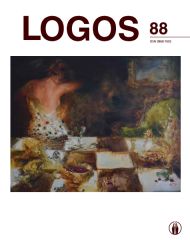Šiuolaikinė Drama: Bandymas Įvertinti Sovietmetį
Contemporary Drama: An Attempt to Evaluate the Soviet Period
Author(s): Aurelija MykolaitytėSubject(s): Theatre, Dance, Performing Arts, Political Philosophy, Post-Communist Transformation, Drama, Philosophy of History
Published by: Visuomeninė organizacija »LOGOS«
Keywords: Post-Soviet Sphere; History of Dependence; Post-Colonial Experience; Hybridity; contemporary drama;
Summary/Abstract: This article aims at revealing the perspective of possible post-colonial research by analyzing the experience common to the countries of the post-soviet bloc. The reality of the Soviet period has been poorly reflected or included in the sphere of modern post-colonial reflections. The most recent dramaturgy helps to restore the memory of the Soviet period that has been consciously or subconsciously expelled as a traumatic experience. The plays by modern authors of East and Central Europe, Vytautas V. Landsbergis and Villiam Klimáček, disclose how the ideological pressure of the Soviets worked and what traumas it exerted on the people. The most obvious sign referring to the cataclysmic experience of Soviet colonialism is hybridity, double identity which denotes split of consciousness and schizophrenic existence. It has been skillfully described in The Captive Mind (Zniewolony umysł) (1953) by Czesław Miłosz. Modern playwrights have the unique possibility of looking at the period of Soviet colonialism from the perspective of the 21st century. They can reflect on past events and give a warning against the unwanted future. The provocative process of reflection about the past, present and future started with the plays by contemporary authors and continueson the stages of modern theatres.
Journal: LOGOS - A Journal of Religion, Philosophy, Comparative Cultural Studies and Art
- Issue Year: 2016
- Issue No: 88
- Page Range: 131-142
- Page Count: 12
- Language: Lithuanian

